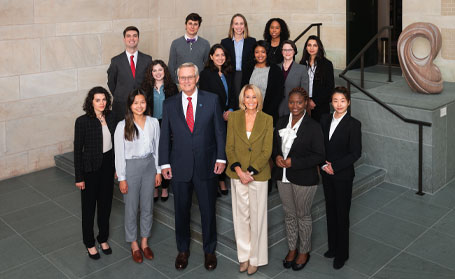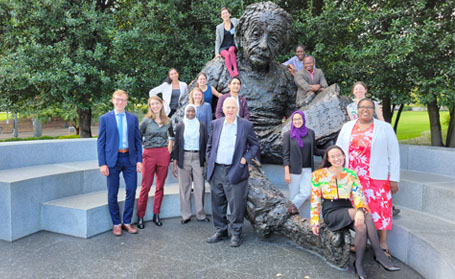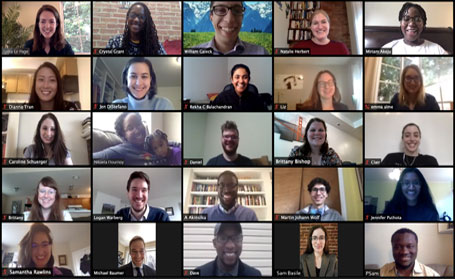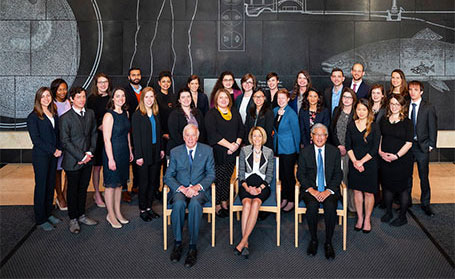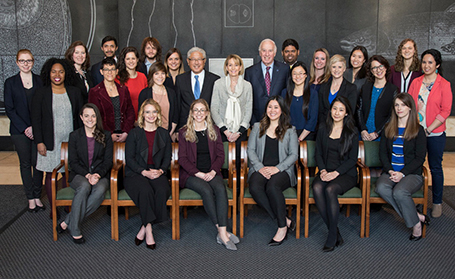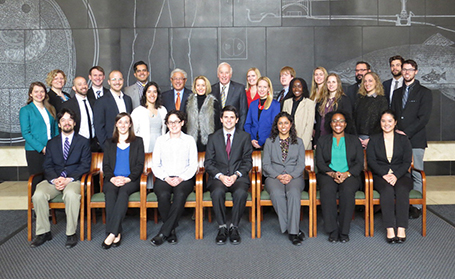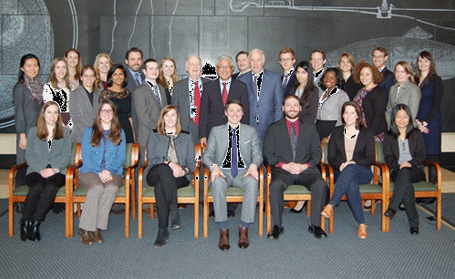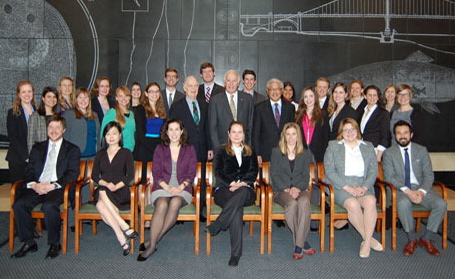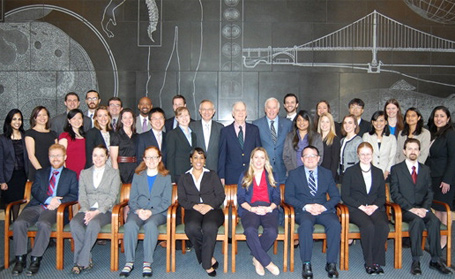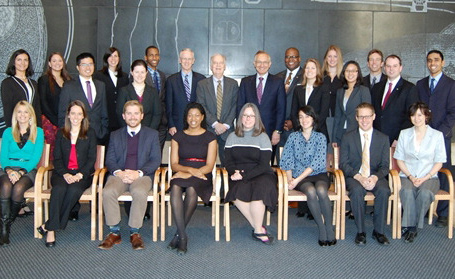The Christine Mirzayan Science and Technology Policy Graduate Fellowship Program
The application for the 2024 Mirzayan Fellowship is no longer open.
Visit our How to Apply page to learn more about the application process.
Launched in 1997, the Christine Mirzayan Science & Technology Policy Graduate Fellowship Program is a full-time, hands-on training and educational program that provides early career individuals with the opportunity to spend 12 weeks at the National Academies of Sciences, Engineering, and Medicine in Washington, DC learning about science and technology policy and the role that scientists and engineers play in advising the nation.
Each year, applicants from around the world join a National Academies unit where they are assigned to a mentor and learn about the world of science and technology policy. An immersive experience, the goals of the Mirzayan Fellowship are to help Fellows:
- Deepen their understanding of science and technology policy;
- Discover new career paths that engage both science and policy communities;
- Understand the role that scientists and engineers play in advising the nation by working closely with a mentor within the National Academies;
- Expand their perception of how the science and technology ecosystem operates in Washington, DC by attending meetings and policy-related activities outside of the National Academies;
- Obtain essential skills and knowledge needed to work in science policy at the federal, state, or local levels; and
- Build a network of Fellows and program alumni who will stay connected with each other and with the Academies.
Staff
If you have any questions, please contact us at MirzayanFellowship@nas.edu.
Program Details
As a full-time, hands-on program experience, the Mirzayan Fellowship brings together a broad range of activities that will expose you to activities both inside and outside of National Academies, including:
Orientation
During orientation week, you will spend the day learning about National Academies processes and build your foundational understanding of science and technology policy work.
Program Unit Work
As the centerpiece of your Fellowship experience, your program unit work will consist of a close collaboration with your assigned mentor to deepen your understanding the way your assigned unit impacts science and technology policy through their work. Your mentor will provide substantive assignments designed to provide an educational experience and opportunities to connect with committee members through meeting observation and direct introductions where possible. Examples of former Fellows' projects include:
- Outlining themes related to leading research in remote sensing applications;
- A workshop on how scientists in developing countries might take better advantage of new wireless communication networks to gain access to the Internet;
- A workshop on the ethical, legal, and societal issues associated with the emerging field of synthetic biology;
- A background paper on the state of knowledge of the demography of street-children and the cost and effectiveness of existing programs that help street-children and orphans in the U.S. and abroad;
- A concept paper exploring the status of the global research university.
Weekly Guest Speaker Series
In addition to Program Unit Work, Fellows also participate in a series of twice weekly guest speaker sessions that will expose them to senior leaders inside National Academies, bring in external experts from the D.C. policy community, and help explore future career paths.
Science and Technology Policy Assignment
During the program, Fellows will complete a group assignment designed to help them learn how to work in a group “committee” setting to write a policy memo about an issue associated with science and technology.
Networking and External Events
Networking and attendance at briefings/meetings are important parts of the Fellowship that help Fellows integrate into the D.C. policy network. Activities include:
- Fellowship Receptions
- Informational Interviews
- National Academies Activities
- External Events
Cohort Community Building Activities
Each year, a new cohort of Mirzayan Fellows joins a robust network of current and former Fellows who become valuable professional resources in their network.
Stipend and Travel Expenses
The Mirzayan Fellowship provides a stipend of $11,000 to offset living expenses during the Fellowship period. The stipend is paid out in one installment during the first week of the program. Additionally, the program covers roundtrip transportation expenses (i.e., airfare, bus fare, or mileage) for Fellows to travel from their U.S.-based residence to Washington, D.C.
Please visit our Program FAQs to learn more.
Apply Now to Join Our Next Cohort!
The application for the 2024 Mirzayan Fellowship is now open! We are seeking early-career scientists, engineers, and medical professionals and/or late-stage graduate students with a strong interest in science and technology policy work.
Please review the information below for details, and reach out to MirzayanFellowship@nas.edu with questions.
Key Dates:
- Application Open: August 7, 2023
- Application Close: October 16, 2023
- Session Start: March 4, 2024
- Session End: May 24, 2024
Program Details
The Christine Mirzayan Science and Technology Policy Graduate Fellowship Program is a full-time hands-on training and educational program that provides early career individuals with the opportunity to spend 12 weeks at the National Academies of Sciences, Engineering, and Medicine in Washington, DC learning about science and technology policy and the role that scientists and engineers play in advising the nation. This Mirzayan Fellowship offers a unique opportunity to obtain the essential skills and knowledge needed to work in science policy at the federal, state, or local levels.
The goals of the Mirzayan Fellowship are to help Fellows:
- Deepen their understanding of science and technology policy;
- Discover new career paths that engage both science and policy communities;
- Understand the role that scientists and engineers play in advising the nation by working closely with a mentor within the National Academies;
- Expand their perception of how the science and technology ecosystem operates in Washington, DC by attending meetings and policy-related activities outside of the National Academies;
- Obtain essential skills and knowledge needed to work in science policy at the federal, state, or local levels; and
- Build a network of Fellows and program alumni who will stay connected with each other and with the Academies.
Participation in the Mirzayan Fellowship provides the opportunity to:
- Explore a new career path and develop professional skills;
- Learn how scientific research gets translated into federal policy;
- Understand how the federal government operates and the role that the National Academies play through advice-making and convening activities;
- Experience Washington, D.C. firsthand and build a network of science and technology policy experts; and
- Participate in a robust cohort experience and join an active alumni community.
Eligibility
We are seeking early-career scientists, engineers, and medical professionals and/or late-stage graduate students with a strong interest in science and technology policy work. International students already based in the United States and individuals with under-represented backgrounds in the sciences, engineering, and medicine are encouraged to apply. We highly encourage those with strong interest but little experience in policy to apply.
Applicants will not be discriminated against based on race, ethnicity, gender, religion, socioeconomic status, disability, sexual orientation, or gender identity. The Mirzayan Fellowship is open to applicants who meet the following criteria:
- Able to attend the full 12-week program in-person in Washington, D.C. from March 4 – May 24, 2024.
- Are one of the following:
- Current graduate, postdoctoral, or professional school student pursuing a terminal degree (e.g., Ph. D, M.D., etc.) in any discipline within the sciences, engineering, or medicine (including the social sciences);OR
- Have obtained their terminal degree or completed post-doctoral/medical doctor training within the last five (5) years in any discipline within the sciences, engineering, or medicine (including the social sciences). Note: Applicants who exceed this limit due to caregiving leave or military service can still apply.
- Are based in the United States and do not require visa sponsorship from the National Academies in order to remain in the U.S. during the program dates.
How to Apply
To apply for the Mirzayan Fellowship please fill out our online application form by following these steps:
- Set up an account on our online application platform by clicking the Register button at the top right of this page. If you have applied before, use the Login button.
- Review the 2024 Mirzayan Fellowship Application Preview document to understand the application requirements.
- Review the list of Prospective Program Units and select up to five that are of interest to you.
- Prepare your application materials, including:
- Short Bio (maximum 250 words)
- Short CV (maximum 3 pages, PDF)
- Preferred program units (Choose 5)
- Two references, which demonstrate how you fulfill the selection criteria outlined in the Selection Process section below. (maximum 2 pages per letter, PDF).
- Note: We recommend that current graduate students include one letter from an academic advisor who knows them well and can confirm the anticipated degree completion date.</em
- Statement of Interest (maximum 500 words)
- Notify your referees. Provide their email address in your application as soon as possible to maximize their time to submit. Note: Mailed reference letters will not be accepted.
- Submit your application materials via our online application platform by October 16, 11:59 pm. Note: All application materials must be complete and submitted via our online form to be considered.
Selection Process
The Mirzayan Fellowship selection process is a merit-based, open competition based on applications generated by interested individuals. After the deadline, alumni and staff readers will review all eligible applications. Following this review, prospective mentors will be invited to review applicant materials, focusing on applicants who selected their host unit as one of their five preferred placements. Semi-finalists selected by each mentor will participate in virtual interviews with program staff and prospective mentors before final placements are made.
The following criteria will be used to evaluate eligible applications and must be addressed by your essay and/or reference letters:
- Demonstrated interest science and technology policy;
- Strong communication skills with the ability to work collaboratively in a professional team;
- Alignment between personal/professional goals and the scope of the program;
- Ability to take a self-directed approach to networking and engagement with policy experts within and outside of the National Academies; and
- Suitability for one or more of the available mentor units.
International students already based in the United States and individuals with under-represented backgrounds in the sciences, engineering, and medicine are encouraged to apply. Applicants with limited previous experience working in Washington, D.C. and/or the federal government will be prioritized. Candidates deviating significantly from the expected profile must demonstrate a reasonable case for consideration through their submitted application.
Please visit our Application FAQs to learn more.
Prospective Units
The National Academies units listed below are accepting Fellows for the 2024 Mirzayan Fellowship. Please note that the list of units accepting Fellows will vary year-to-year. You may select up to 5 units who you would like to view your application, and we would highly recommend you select the maximum.
Division of Behavioral and Social Sciences and Education (DBASSE) Division Website
Participating Units within DBASSE:
Board on Children, Youth, and Families (BCYF)
Board on Environmental Change and Society (BECS)
Board on Science Education (BOSE)
Committee on Law and Justice (CLAJ)
Division on Earth and Life Studies (DELS) Division Website
Participating Units within DELS:
Board on Atmospheric Sciences and Climate (BASC)
Board on Chemical Sciences and Technology (BCST)
Board on Life Sciences (BLS)
Ocean Studies Board (OSB)
Polar Research Board (PRB)
Water Science and Technology Board (WSTB)
Division on Engineering and Physical Sciences (DEPS) Division Website
Participating Units within DEPS:
Board on Energy and Environmental Systems (BEES)
Board on Mathematical Sciences and Analytics (BMSA)
National Materials and Manufacturing Board (NMMB)
Space Studies Board (SSB)
Gulf Research Program (GRP) Division Website
Participating Units within GRP:
Board on Gulf Education and Engagement (BGEE)
Gulf Environmental Protection and Stewardship Board (GEPS)
Gulf Offshore Energy Safety Board (GOES)
Health and Medicine Division (HMD) Division Website
Participating Units within HMD:
Board on Health Care Services (HCS)
Board on Health Sciences Policy (HSP)
National Academy of Engineering (NAE) Division Website
Participating Units within NAE:
National Academy of Engineering Programs
National Academy of Medicine (NAM) Division Website
Participating Units within NAM:
Health Policy Fellowships and Leadership Programs
National Research Council Executive Office (NRCEO) Division Website
Participating Units within NRCEO:
Office of Congressional and Government Affairs (OCGA) Division Website
Participating Units within OCGA:
Office of Congressional and Government Affairs (OCGA)
Policy and Global Affairs Division (PGA) Division Website
Participating Units within PGA:
Board on Higher Education and the Workforce (BHEW)
Board on Science, Technology and Economic Policy (STEP)
Committee on Science, Technology and Law (CSTL)
Committee on Women in Science, Engineering and Medicine (CWSEM)
Science and Engineering Capacity Development (Capacity)
Current and Past Fellows
2024 Fellows
View the 2024 Biographical Sketches
2023 Fellows
View the 2023 Biographical Sketches ![]() (1.1Mb)
(1.1Mb)
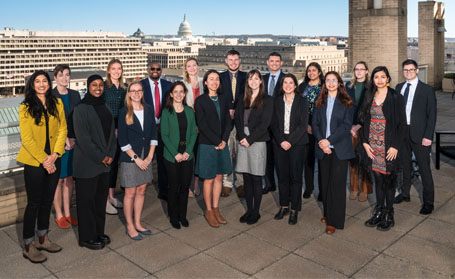
2012 Winter Biographical Sketches
2011 Fall Biographical Sketches
2011 Winter Biographical Sketches
2010 Fall Biographical Sketches
2010 Winter Biographical Sketches
2009 Winter Biographical Sketches
2009 Fall Biographical Sketches
2008 Fall Biographical Sketches
2008 Winter Biographical Sketches
2007 Summer Biographical Sketches
2007 Fall Biographical Sketches
2007 Winter Biographical Sketches
2006 Summer Biographical Sketches
2006 Fall Biographical Sketches
2006 Winter Biographical Sketches
2005 Summer Biographical Sketches
2005 Fall Biographical Sketches
2005 Winter Biographical Sketches
2004 Summer Biographical Sketches
2004 Fall Biographical Sketches
2004 Winter Biographical Sketches
2003 Summer Biographical Sketches
2003 Fall Biographical Sketches
2003 Winter Biographical Sketches
2002 Summer Biographical Sketches
2002 Fall Biographical Sketches
2002 Winter Biographical Sketches
2001 Summer Biographical Sketches
2001 Winter Biographical Sketches
2000 Summer Biographical Sketches
2000 Winter Biographical Sketches
1999 Biographical Sketches
1998 Biographical Sketches
1997 Biographical Sketches
Frequently Asked Questions
Program FAQs
Select the categories below for responses to frequently asked program questions.
General
What are the National Academies?
The National Academies of Sciences, Engineering, and Medicine work together to provide independent, objective analysis and advice to the nation and conduct other activities to solve complex problems and inform public policy decisions. The National Academy of Sciences was created in 1863 by a congressional charter approved by President Abraham Lincoln. Under this charter, the National Research Council was established in 1916, the National Academy of Engineering in 1964, and the Institute of Medicine in 1970. We are a private, non-governmental organization and do not receive direct federal appropriations for our work.
The majority of the studies carried out by the National Academies are conducted at the request of government agencies. However, many studies are privately funded. Most of our work is conducted through seven major programs. Learn more by watching this video about National Academies’ Impact and Mission.
What is the Mirzayan Fellowship?
The Christine Mirzayan Science and Technology Policy Graduate Fellowship Program (Mirzayan Fellowship) is a 12-week training and educational program taking place in Washington, D.C. at the National Academies’ Keck Center offices. It is a full-time (37.5 hours per week), hands-on training and educational experience designed to engage Fellows in the process that informs science and technology policy through a placement within one of National Academies’ program units. By participating in this program, you will develop the basic skills and know-how essential to working or participating in science policy at the federal, state, or local level.
Who was Christine Mirzayan?
Christine Mirzayan was a Fellow in the second year of the Policy Fellowship Program and was assigned to the Center for Education. She had recently finished her PhD from the University of California in San Francisco and had been selected as a 1998 American Association for the Advancement of Science (AAAS) Congressional Fellow.
At UCSF, her research focused on the development of the vertebrate nervous system. In particular, she analyzed the molecular mechanism by which diffusible cues guide the migration of developing axons. While at UCSF, she found that although she enjoyed basic research, she was increasingly interested in the role that science plays in society and looked forward to a career that would allow her to utilize her scientific knowledge to address the political and social problems facing our nation.
Tragically, she was unable to reach that goal when she lost her life during the last week of the Policy Fellowship Program. The National Academy of Sciences has renamed the program in her honor.
To learn more about Christine Mirzayan, please visit these sites:
The Fellowship Program
What do Mirzayan Fellows do?
As a full-time, hands-on program experience, the Mirzayan Fellowship exposes Fellows to a broad range of activities both inside and outside of National Academies, including:
- Working closely with a mentor in your assigned program unit;
- Participating in a weekly guest speaker series;
- Completing a science and technology policy assignment;
- Networking and attending Fellowship receptions and external events; and
- Building community with other cohort members.
Does the Fellowship provide a stipend or other funding?
Yes, the Mirzayan Fellowship provides a stipend of $11,000 to offset living expenses during the Fellowship period. The stipend is paid out in one installment during the first week of the program. Additionally, the program covers roundtrip transportation expenses (i.e., airfare, bus fare, or mileage) for Fellows to travel from their U.S.-based residence to Washington, D.C. The Mirzayan Fellowship does not fund research-related activities, award scholarships, or provide financial aid assistance of any kind. Fellows are not considered employees, as they are placed within the National Academies for a short-term educational training experience.
Is the Mirzayan Fellowship an in-person or virtual program?
The Mirzayan Fellowship is an in-person program held primarily at the National Academies’ Keck Center in downtown Washington, D.C. All required Fellowship sessions (e.g., orientation, weekly guest speakers, networking receptions, etc.) will be held in-person. However, many employees of the National Academies are currently working in a hybrid setting. Therefore, you will be expected to follow the hybrid work norms of your assigned unit for all program work.
What program unit will I work with during the Fellowship?
Please see the Prospective Units for a listing of all the program units that are accepting fellows next year. Look at the web page for each unit to gain an understanding of unit activities and active studies. In your application, you may apply for up to 5 units, and we strongly encourage you to select the maximum number.
Once Selected
Can I miss orientation or do a shortened fellowship?
No. Acceptance to the program is contingent upon attending orientation in its entirety, and Fellows must complete the full 12-week term and be available to start their fellowship on the first scheduled day of orientation. Any request for scheduled leave (personal or professional) during the term of the fellowship must be approved by program staff and the mentor host unit.
Where can I find more information about housing during the fellowship
Fellows are responsible for obtaining housing during the fellowship period. Program alumni suggest searching Craigslist, Airbnb, and Facebook Marketplace for housing opportunities. In addition, many universities in Washington, DC, Virginia, and Maryland offer suggestions for off-campus housing. Program alumni recommend visiting the Georgetown University, George Washington University, and American University websites.
A housing guide will also be sent out following selection, which will include more details and suggestions for finding short-term housing in DC.
Application FAQs
Select the categories below for responses to frequently asked application questions.
Eligibility
Can undergraduates apply for the Program?
No. The program is for graduate students, postdoctoral students, and professional school students (e.g, Master's, JD, MD, PhD) or recent graduates (i.e., within the past 5 years).
Can graduate students apply for the Program?
Yes. Current graduate, postdoctoral, or professional school students pursuing a terminal degree (e.g., Ph. D, M.D., etc.) in any discipline within the sciences, engineering, or medicine (including the social sciences) are eligible to apply. Priority will be given to students in the last two years of their terminal degree.
Can I apply if I've completed my terminal degree?
Yes. If you completed your graduate studies (degree awarded) within the last 5 years, you are eligible to apply.
Are the social sciences considered as a "science"?
Yes, social scientists are welcome to apply.
Can law and business students in professional programs apply?
Yes. Given the importance of science and technology today, students in professional schools undoubtedly benefit from exposure to science and technology policy issues.
Can active-duty military officers apply?
Yes. However, there may be some limitations of which program units you can be placed with, and you will need to complete additional conflict of interest review steps. Please contact us at MirzayanFellowship@nas.edu so we can discuss your specific situation.
Application
I have applied for the Mirzayan Fellowship before. Can I re-use my application?
Returning applicants are welcome to re-apply for the Fellowship but must submit a new application. Application materials do not carry over from session to session, and incomplete applications will not be considered.
How many references do I need?
Two online references are required to complete the application process. References must be relevant to your academic, professional, volunteer, or other related experience. You will not be able to submit your application until both references have been received. Mailed or emailed reference letters will not be accepted.
How will my referees be notified?
Once you complete the reference section of the application and provide your referees’ contact information, click on initiate email request, and an email will be sent to each referee. Be sure to provide your referees with as much time as possible to ensure that their reference is submitted before the application deadline.
What if I don’t see a program unit available in my area of expertise (e.g., molecular biology, cultural anthropology in Africa, etc.)?
While we try to place fellows in the units of their choice, the purpose of this Fellowship is to broaden the fellow's experience and provide opportunities to explore new areas. Professionals working in science and technology policy are often called upon to apply their research skills to engaging with new scientific areas, so we encourage prospective applicants to keep an open mind about working in areas outside of their specific field of study.
When will the prospective candidates be informed of their acceptance?
Candidates selected for interviews are generally notified within three to six weeks of the application deadline. Unsuccessful applicants will be notified when the selection process is complete (approximately two-three months after the application deadline).
International Applicants
Can international students apply?
International students based in the United States are encouraged to apply. However, we are not able to accept Fellows who are not based in the United States already per our eligibility requirements. Please note that the National Academies is not able to provide visa sponsorship and Fellows must have an immigration status that allows them to attend the full duration of the program dates.
Does the Fellowship Program have a citizenship requirement?
No. However, the Fellowship does not offer visa sponsorship, so applicants who are not U.S. citizens or U.S. permanent residents must hold one of the following visas covering the full program dates:
- F-1 Students using CPT (Curricular Practical Training)
- F-1 Students using OPT (Optional Practical Training)
- J-2 Dependents
- J-1 Students using academic training
- J-1 Research Scholars with written approval of their Responsible Officer
- DACA recipients
- Adjustment Applicants, Refugees, Asylees, and Selected other visa classes
Am I eligible if I have temporary worker status (H-1B or TN)?
No. The Mirzayan Fellowship is a fellowship award, not employment by the National Academies.
Key Dates
| Application Open | |
|---|---|
| August 7, 2023 | |
| Application Close | |
|---|---|
| October 16, 2023 | |
| Session Start | |
|---|---|
| March 4, 2024 | |
| Session End | |
|---|---|
| May 24, 2024 | |
CONTACT US
The National Academies of Sciences, Engineering, and MedicineChristine Mirzayan
Science & Technology Policy
Graduate Fellowship Program
Washington, DC 20001
Email: MirzayanFellowship@nas.edu





